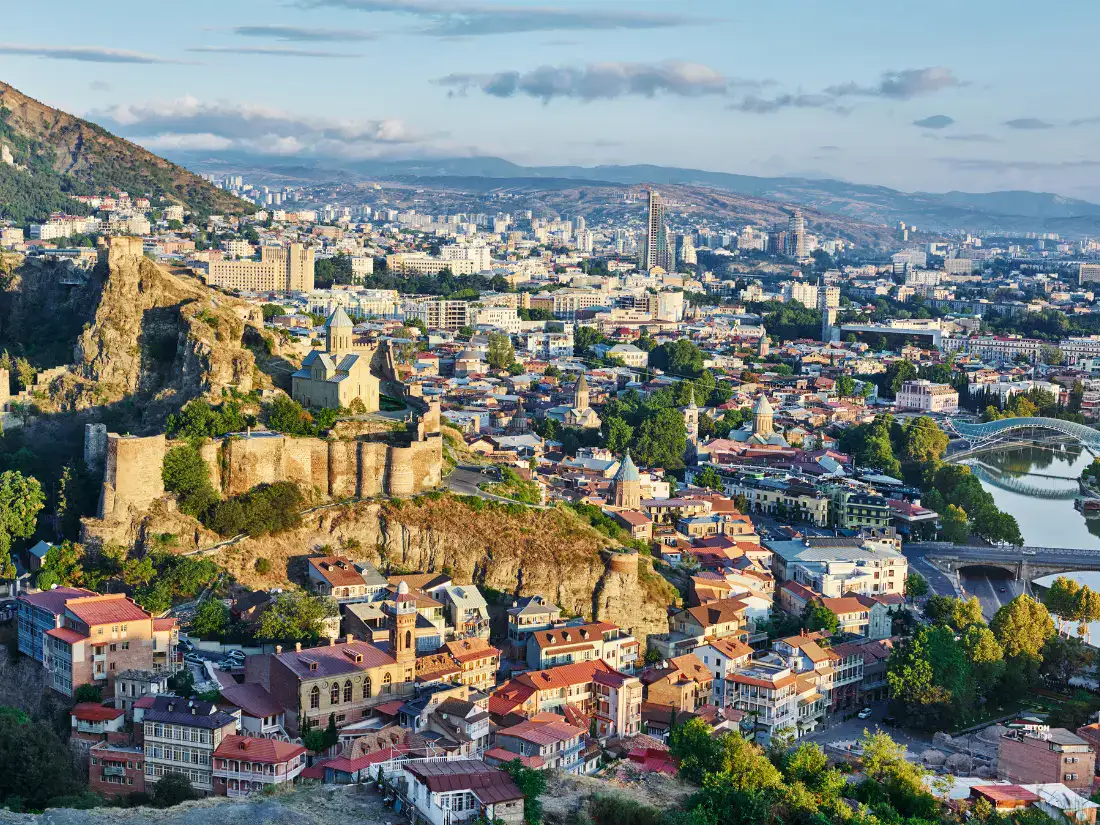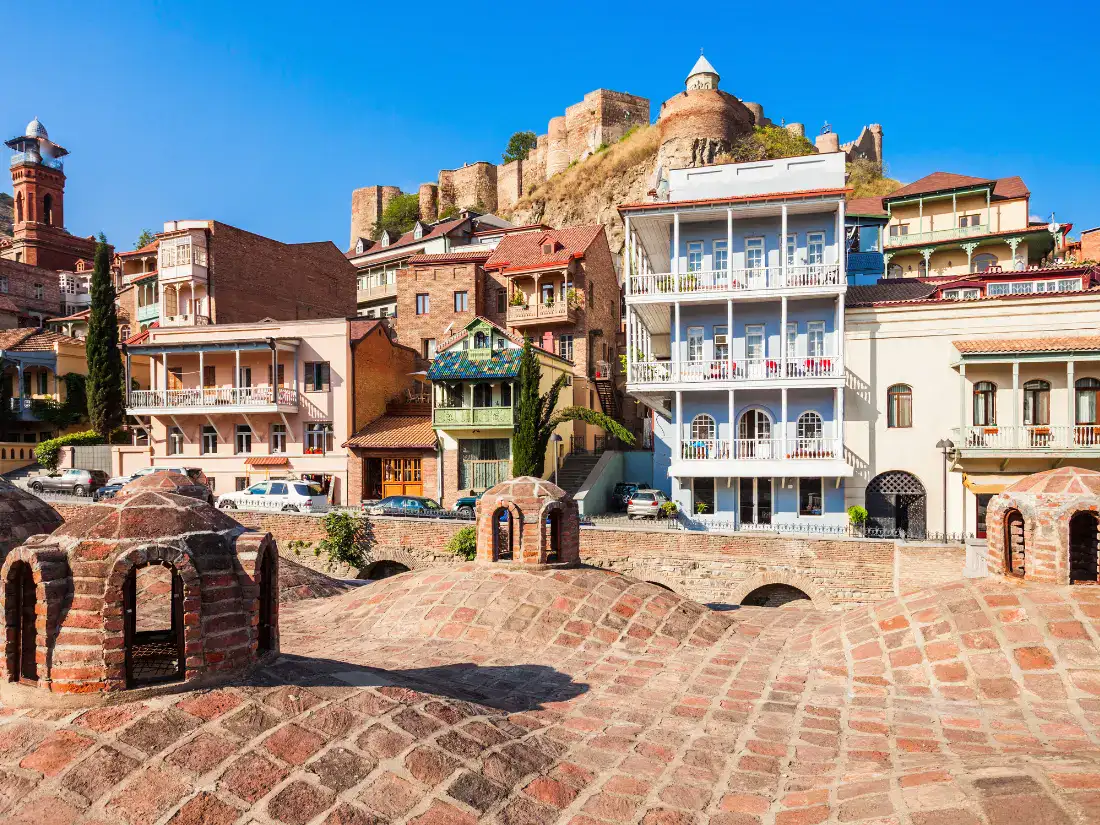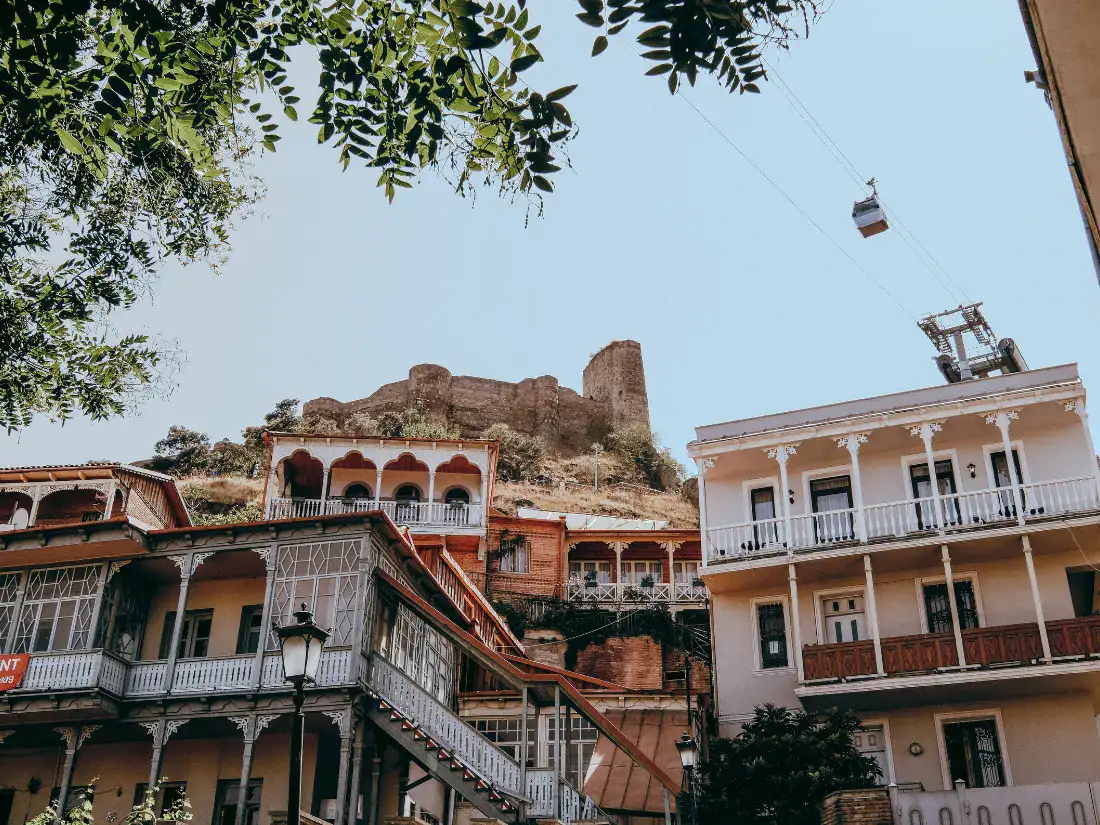Have you ever considered being a digital nomad in Tbilisi? Making this vibrant and historic city your next destination is a good idea: you will work from coworking spaces that redefine “working in style” to charming cafes perfect for opening your laptop and creating fantastic content.
And the best part? The local and expat communities are incredibly welcoming, making you feel at home in no time.
So, if you’re looking for a mix of adventure, culture, a good internet connection, and great value for money, Tbilisi might be the perfect place to hang your nomad hat. Let’s find out why you should consider spending time in the Pearl of the Caucasus!
Why Choose To Be a Digital Nomad in Tbilisi

Tbilisi has long established itself as a hub for digital nomads, thanks to its blend of history and modernity, and surprisingly affordable cost of living (yes, I’m talking about $$$). Life there allows you to stretch your budget without sacrificing quality — trust me on this.
Events, workshops, and meetups make it easy to connect with other professionals and help you feel at home, even when you’re far from it. Georgian hospitality truly lives up to its reputation, and many who come for a short visit end up extending their stay, drawn in by the environment and new friendships.
Speaking of extending your stay, it’s not tricky here: you can stay for up to a year as a tourist without needing to apply for a visa or residence permit.
The city is a treasure trove, ideal for those seeking creative stimulation outside the workspace. Here are the reasons why you should consider spending some time there:
- Tbilisi is welcoming and affordable. Georgia is renowned for its world-class hospitality, making it easy to feel at home.
- Georgia allows stays of up to one year on a tourist visa, providing enough flexibility to explore the country and get a taste of local life.
- As a destination with excellent value for money, a lively atmosphere, and a rich culture and history, Tbilisi attracts many remote professionals and digital nomads. This makes it easy to make friends and find like-minded people.
- It’s a fascinating city to explore. The historic center always hides a new café or atelier in its alleys, and Georgia’s mountains are perfect for hiking and nature lovers.
- Lastly, the city boasts many cafés and coworking spaces that offer great food, reliable internet, and a comfortable place to spend your working hours.
How to Get to Tbilisi and the Best Time to Visit
Getting to Tbilisi is easier than falling in love with the city—and trust me, falling in love here is very easy! You can find reasonable airfares and direct flights from several European cities. For instance, I paid $ 400 for a flight from Budapest with the Polish low-cost airline LOT Airlines.
For those coming from farther away, such as Brazil or the United States, you’ll likely have a layover in hubs like Istanbul, Paris, or Dubai. Upon arriving at Tbilisi International Airport, you’ll find various options to get to the city center, including buses, taxis, and rideshare apps. It’s all practical, quick, and, best of all, easy on the wallet.
When deciding the best time to visit, go for spring (March to May) and autumn (September to November). These months offer very pleasant weather—not too hot, not too cold—making it perfect for strolling through the city’s charming streets and enjoying outdoor cafés without any hassle. Additionally, you’ll avoid the summer tourist crowds and save money with more affordable prices.
Coworking Spaces and Connectivity in Tbilisi
The good news for those who like to work outside the home is that the coworking spaces in Tbilisi are the definition of “working in style.” Places like “Impact Hub Tbilisi” and “Terminal” offer fast and reliable internet in a super modern work environment.
You’ll find startups and creative freelancers, all sharing ideas and enjoying fresh coffee. And the best part? The prices are very budget-friendly, making it easy to keep costs low without sacrificing quality.
Top 5 Best Cowrking Spaces in Tbilisi
- Terminal: Terminal has over 9,000 square meters of space and more than 1,100 people capacity. Terminal is one of the largest coworking organizations in Tbilisi. They have multiple locations, including Vake and Saburtalo.
- Impact Hub: Located in Marjanishvili, Impact Hub is a favorite coworking space. It offers a friendly environment, free coffee and tea, and dedicated spaces for phone calls if needed.
- SpaceZ: A cozy space in Saburtalo, SpaceZ may not be significant but provides a pleasant working environment. It’s ideal for those seeking a quiet and inspiring place to work.
- Ano: Situated on Tsereteli, Ano is another popular coworking space. While it has few reviews, it’s known for its welcoming atmosphere.
- Fabrika: Located in the heart of the vibrant Marjanishvili neighborhood, Fabrika is not just a coworking space but a massive cultural center. Formerly a sewing factory, this space has been transformed into a creative hub that hosts artists, entrepreneurs, and digital nomads. In addition to comfortable workspaces and robust internet connectivity, Fabrika features a lively courtyard, stylish cafes, and a constant lineup of cultural and artistic events, making it a perfect spot for those seeking inspiration and active networking.
Finding Accomodation in Tbilisi For Digital Nomads

As I mentioned earlier, Tbilisi is known for offering comfortable and affordable accommodations, though the landscape has changed somewhat since the Ukraine war. Nonetheless, prices remain lower than in most European capitals.
You can choose from hostels, colivings, or even furnished rooms and apartments available for short-term rent. During my stay, which lasted nearly three months, from June to August 2022, I paid €730 (or €365 per person per month).
I stayed in Tsotne Dadiani, a bit outside the city center and tourist areas but with good access to them. Being a more residential neighborhood, it was pretty affordable, and for that price, I got a large apartment with a living room, kitchen, and even a balcony.
To simplify your search, platforms like Airbnb, online communities, and local websites can help you find the perfect place. Many landlords in Tbilisi are familiar with the digital nomad lifestyle and offer flexible leases and amenities like high-speed Wi-Fi, which is essential for staying connected.
Best Neighborhoods for Digital Nomads in Tbilisi
Here are some tips on the best places to stay in Tbilisi:
Vake is a neighborhood that seems tailor-made for digital nomads. It’s chic, green, and filled with cafes and restaurants perfect for working during the day and socializing at night. You’ll find many coworking spaces and a lively, young atmosphere. Plus, Vake Park is an excellent spot for taking breaks between work sessions.
If you prefer being in the heart of local history and culture, Sololaki is your place. This neighborhood is right in the old center of Tbilisi, where cobblestone streets tell centuries-old stories. The apartments are charming and often come with cute balconies overlooking the city. It’s an excellent option for those seeking inspiration from traditions and architecture.
Lastly, we can’t forget about Saburtalo. Modern and practical, Saburtalo is ideal for those seeking efficiency and convenience. This neighborhood is a bit more residential but has great internet connections and is close to several universities, meaning lots of youthful energy and ideas.
Each neighborhood has its charm and advantages, so it depends on what you’re looking for in your Tbilisi experience.
TIPS FOR RENTING LONG-TERM APARTMENTS
Here are some practical tips to help you find a place to live in Tbilisi:
- Do Your Research: Explore local sites like MyHome.ge and Place.ge. These portals are very popular in Georgia and offer various apartment options. Don’t worry; both have English versions. Pay attention to details like location, price, and whether the apartment is furnished. While they cater more to locals, you can negotiate a temporary rental.
- Choose the Right Neighborhood: As mentioned, neighborhoods like Vake, Sololaki, and Saburtalo are great for digital nomads. Each has unique features, so think about what’s most important to you: proximity to cafes and coworking spaces, vibrant nightlife, or a quieter residential environment.
- Check Connectivity: Fast and reliable internet is essential. Always ask about the quality of the Wi-Fi before making a decision. Most apartments in Tbilisi offer good-quality internet, but it’s always good to confirm.
- Negotiate the Rent: In Tbilisi, negotiating rent is expected. If you plan to stay for an extended period, many landlords are willing to offer discounts. Don’t be afraid to haggle a bit!
- Read the Contract Carefully: Ensure you understand all the clauses in the rental agreement or listing (in case of Airbnbs, for example). Ask about the deposit policy, cancellation conditions, and maintenance responsibilities to avoid any unpleasant surprises.
- Use Groups and Social Media: Facebook groups like “Expats in Tbilisi” can be a great source of tips and recommendations. Many expats share experiences and apartment listings in these groups.
Daily Life and Culture in Tbilisi
Let’s start with history, of which Tbilisi has plenty to share. In the historic center, also known as Old Tbilisi, you’ll find narrow streets lined with beautiful wooden houses featuring intricately carved balconies, a Georgian tradition.
Life here seems frozen in time, and you can spend hours exploring small craft shops, cozy cafes, and, of course, the traditional sulfur baths dating back to the Persian and Roman periods. Don’t miss visiting Narikala Fortress, which offers a panoramic city view.
Exploring Local Food

Georgian cuisine is another cultural aspect you can’t miss. It’s a delightful mix of Eastern European, Middle Eastern, and Asian influences, offering a flavor palette as rich and complex as the country’s history.
Georgians take their food seriously, and a meal here often stretches over several hours, accompanied by toasts made with local wine, renowned for its exceptional quality and traditional winemaking methods. Consider joining a wine tasting to learn more about it.
Every corner of Tbilisi has bakeries selling khachapuri, a bread filled with melted Georgian cheese that is practically a national institution! Each region of Georgia has its version, but the Adjarian khachapuri, boat-shaped with an egg in the center, is especially popular in Tbilisi. It’s the perfect breakfast or snack anytime.
Don’t miss trying khinkali, a dumpling filled with meat and spiced broth. Learning to eat khinkali without making a mess—holding it by the “stem,” taking a bite, and sipping the hot broth before devouring the rest—is a rite of passage for Georgians. When you master eating it “the right way,” you can be considered a grown-up.
In addition to meat, modern versions include mushrooms, potatoes, or cheese fillings, ensuring there’s something for every taste.
For those who enjoy complex flavors, ajapsandali, a Georgian ratatouille, is a sensory explosion. Made with eggplant, bell pepper, tomato, onion, and plenty of herbs, it’s an excellent option for vegetarians. And we can’t forget about satsivi, a traditional dish of chicken in a walnut sauce, often served during winter holidays but loved year-round.
And if you love to get hands-on, how about a Georgian cooking class? Learn to make the famous khachapuri and impress your friends at the next dinner party.
You can also join a wine workshop to learn about local grapes, taste some labels, and discover the traditional production technique that makes Georgian wines famous worldwide!
Events and Cultural Activities for Nomads
Besides food and architecture, Tbilisi boasts a vibrant arts and culture scene. The city is full of contemporary art galleries, theaters, and some of the best nightlife in this part of Europe, reflecting the young and dynamic energy of the local population.
There’s always something happening, from music festivals to art exhibitions and street performances!
Start with the Tbilisi Open Air, a music festival that gets everyone out of their shell. Imagine a mix of electronic beats and rock under Tbilisi’s starry sky, surrounded by new friends from all over the world.
If you’re more into films than music, the Tbilisi International Film Festival is a treat. Not every day you get to watch incredible movies in ancient cinemas scattered around the city, right?
Besides festivals, you can’t miss Fabrika, the coolest place in Tbilisi. Named after its original function as a textile factory, it’s now a major social hub. Fabrika hosts a hip hostel for travelers, art studios for local creatives, and a series of bars and cafes serving everything from breakfast to late-night drinks.
Thanks to quality Wi-Fi, it’s the perfect place to work during the day with your laptop and to relax and socialize after hours.
For those who love to dance until dawn, Bassiani is the place to be. This massive techno club, located in the basement of the National Football Stadium, has gained an international reputation as one of the best spots for electronic music in Europe. It’s a meeting point for genre lovers seeking intense experiences in an underground setting.
Joining a pub crawl is a good way to get to know the best bars and clubs in town and maybe make some new friends. Check it out!
Networking Tipos and Community for Digital Nomads in Tbilisi
- Be Present in Coworking Spaces: Tbilisi has great coworking spots like Impact Hub and Fabrika. These places are ideal for focusing on work but also attract networking events, workshops, and lectures. They often host breakfasts, happy hours, and other events perfect for meeting new people while you unwind.
- Explore Cafes and Bookstores: Local cafes and bookstores are great for meeting other travelers. Spend an afternoon at Prospero’s Books or Café Gallery with your laptop. These places foster easy conversation; you never know who might sit at the table next to you!
- Attend Events and Meetups: Keep an eye out for tech, design, or other meetups that interest you. Platforms like Meetup.com or Facebook events in Tbilisi are great for finding out what’s happening. And don’t forget the festivals! Tbilisi loves its music and art festivals, offering fantastic opportunities to mingle and make new friends.
- Leverage Social Media: Before arriving in Tbilisi, join Facebook groups like “Expats in Tbilisi” and “Digital Nomads Tbilisi.” These groups are excellent for getting local tips, finding events, and even organizing your own meetups!
- Be Curious and Open: The best part of being in Tbilisi is the incredible mix of cultures and stories you’ll encounter. Be curious about people and share your own experiences. Georgians are known for their hospitality, so you’ll soon be invited to more barbecues and dinners than you can count.
Handling Practical Issues in Tbilisi
Like any place, dealing with the practicalities of daily life can be challenging, especially when you’re a digital nomad exploring new territories.

Guides on Visas and Legal Stay
If, after reading all this, you’re seriously considering setting up your remote workstation in Tbilisi, here’s a straightforward guide on visas and legal stay in Georgia. Let’s demystify the process so you can focus on what truly matters: exploring this fantastic city!
- Who Needs a Visa? Georgia is very friendly when it comes to visas. Citizens from many countries can enter visa-free for up to a year! This includes many EU countries, the United States, Canada, Australia, and Brazil. Just arrive with a valid passport, and you’re good to go for up to 365 days.
- Want to Stay Longer? If a year isn’t enough to satisfy your craving for Khachapuri and the Caucasian mountains, you can apply for a long-term visa while still in the country. This visa can be for work, study, or just a longer stay, and it will require a bit more paperwork, like proof of income or an acceptance letter from a Georgian educational institution.
- Working Legally: If you plan to do more than work remotely for a non-Georgian company, like starting a local business or taking up jobs here, you’ll need a work visa. This typically requires an invitation from a Georgian employer and other documents proving your future occupation here.
- Tips for the Process: Most visa processes and renewals can be done online through the Georgian Immigration Services website. It’s super convenient! To avoid any headaches with deadlines, set a reminder to start handling your renewal or new visa well before your current one expires.
- Keep Everything in Order: Even with the ease of entry, always keep your passport updated and stay aware of local immigration rules. They tend to be strict about baggage inspections, so don’t carry anything illegal.
Health and Safety: What You Need to Know
Georgia is a safe country, as is Tbilisi. But like any big city, keeping an eye on your belongings is good, especially in touristy or crowded places. Always keep your bags and backpacks in sight.
Georgian food is delicious, but sanitation standards might not be as strict as you’re used to. Many items are sold without proper packaging, such as in old plastic bottles. I had no issues during my stay, but observing how food is prepared is wise, especially if you venture into street markets.
Also, note that the emergency number in Georgia is 112. It’s a good idea to save this number in your phone, along with the address and phone number of your country’s embassy or consulate, just in case.
Travel Insurance for Georgia
For years, I traveled without finding a good insurance solution for myself. Most plans on the market were designed for holiday travelers. This meant I had to purchase insurance before departure and pay for the entire policy upfront, with little flexibility if I wanted to change my plans.
That’s where SafetyWing comes in. Designed for nomads and frequent travelers, the company offers travel and health insurance with global coverage, flexible plans, and affordable prices. Signing up is simple and entirely online, with monthly renewals that you can pause anytime. Just click a button.
Nomads Insurance covers 185 countries with budget-friendly monthly payments. Click here to learn more.
Money and Currency in Tbilisi: Practical Information for Digital Nomads
The official currency in Georgia is the Georgian Lari (GEL). It’s a good idea to familiarize yourself with the exchange rates and have some local currency on hand for small purchases. While many places in Tbilisi accept credit cards, cash is still widely used, especially in markets, smaller shops, and some cafes.
ATMs and Banking
ATMs are plentiful in Tbilisi, and most accept international cards. However, be aware of the fees your home bank may charge for international withdrawals. Some local banks to look out for include TBC Bank and Bank of Georgia, both of which have extensive ATM networks.
Cost of Living
One of the major draws of Tbilisi for digital nomads is its affordable cost of living. Accommodation, food, and transportation are relatively cheap compared to Western Europe and North America. This allows you to stretch your budget further while enjoying a high quality of life.
How to Manage Your Money
Managing money across borders can be challenging, but Wise (formerly TransferWise) offers digital nomads a practical and viable solution. Wise provides a fast, transparent money transfer service with significantly lower fees than conventional banks. Here’s why Wise is a great choice:
- Actual Exchange Rates: Wise uses mid-market rates without the excessive markups that many banks apply.
- Multi-Currency Account: With an associated Mastercard debit card, you can hold, exchange, and spend money in over 50 different currencies.
- Ease of Use: Transferring money to your Wise account is straightforward. You can even make a pix, and the converted money is instantly in your account.
☀️ Open your Wise account for free and start managing your finances more efficiently while living in Tbilisi. Click here to get started with Wise.
Transportation in Tbilisi and Traveling Around Georgia
First, Tbilisi is a wonderfully walkable city, especially in the historic center. Put on some comfortable shoes and enjoy walking around. But if you get tired, no problem!
Tbilisi has a super convenient metro system with two lines covering much of the city. It’s quick, efficient, and cheap, perfect for avoiding traffic or saving energy.
Buses are an option for routes not covered by the metro. They’re well-connected and also economical. But make sure to have the right coins, as not all buses accept cards.
Marshrutkas, the minivans you’ll see everywhere, are an experience of their own. They stop almost anywhere and are great for experiencing local life, though be prepared for a somewhat lively ride!
Marshrutkas also travel between cities, which is a good way to explore the country. They’re generally very cheap. Alternatively, trains and intercity buses offer a comfortable way to enjoy Georgia’s stunning landscapes without having to drive.
If you need a taxi, apps like Bolt or Yandex are reliable and help you avoid the risk of exorbitant fares.
Language and Cultural Differences
Georgian is one of the oldest languages still in use, and its unique script, the Georgian alphabet, is a work of art. Its 33 curvilinear letters might seem intimidating at first, but learning a few basic phrases can open many doors and hearts.
Expressions like “Gamarjoba” (Hello) and “Madloba” (Thank you) are a good start and always elicit smiles. Many Georgians speak fluent Russian, a legacy of the Soviet era. Among the younger, urban generation, English is becoming quite popular.
Most Georgians follow the Georgian Orthodox Church, and religion plays a significant role in the culture. You’ll see many ancient churches and monasteries and some UNESCO World Heritage Sites. Respecting these spaces is crucial; for example, modest dress is expected when visiting religious sites.
And don’t expect European punctuality! Time here is viewed more fluidly, so embracing a slower pace can help you integrate better.
A firm handshake is common when meeting someone, and direct eye contact is seen as a sign of sincerity. Don’t be surprised by the close physical proximity during conversations; Georgians are known for their warmth and lack of personal space.
Another thing to know is that Georgians are generally quite conservative. Although Tbilisi might not reflect this as much, there are still many taboos regarding issues like premarital sex, clothing, gender roles, and recreational drug use.
Regarding LGBTQIA+ rights, demonstrations and parades promoting equality are relatively new and can sometimes face significant opposition. However, a growing and active community is working towards greater acceptance and change.
Conclusion: Is it Worth Living as a Digital Nomad in Tbilisi?
So, is it worth unpacking your bags and setting up your laptop in Tbilisi to live the digital nomad life? The short answer is: yes, absolutely! But let’s dive into the details to show why this city could be the perfect backdrop for your next remote adventure.
First, Tbilisi is a city that blends tradition with a touch of modernity, offering a setting full of creative energy. The cost of living here is a major draw, especially when compared to many European or North American destinations. You can live well without breaking the bank, which is music to the ears of any budget-conscious digital nomad.
Moreover, the city has cool coworking spaces and cozy cafes with reliable Wi-Fi. Not to mention Tbilisi’s cultural scene, with its art galleries, music festivals, and markets, ensuring there’s always something new to explore after you close your laptop.
And, of course, we can’t forget about the community of like-minded people there! Local and expats are generally open and friendly, making forming new connections and building a support network easy. Attending meetups or local events can quickly turn coworkers into lifelong friends.
This makes Tbilisi an attractive destination for digital nomads seeking a new temporary home. So why not pack your bags, grab your passport, and give Tbilisi a chance?
Have questions about life in Tbilisi? Leave a comment!
Editor of Yes, Summer! I am a Brazilian journalist, writer, and digital nomad. I have been traveling the world, telling stories, and tasting local beers since 2010. I am the co-founder of 360meridianos, a reference in travel writing in Brazil, and author of the newsletter Migraciones. On social media, I'm always reachable at @natybecattini.
